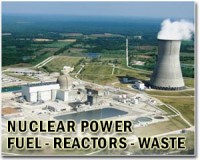 |
Johannesburg (AFP) Nov 12, 2010 South Africa has uncovered a new way to power vital nuclear medical technologies without using weapons-grade uranium, which could ease global worries about nuclear arms trafficking. After voluntarily dismantling its weapons programme, democratic South Africa used the leftover nuclear fuel to produce medical isotopes, which are used by doctors for imaging technology. South Africa is one of the world's top three producers of molybdenum-99, better known as moly, used in 80 percent of the 50 million nuclear medical procedures performed globally each year. Normally, moly is created with the same type of uranium used to make nuclear arms, creating a problem for efforts to corral weapons-grade uranium. But a new technique designed by the South African Nuclear Energy Corporation (Necsa) allows scientists to create moly using low-enriched uranium, rather than the highly enriched type needed for bombs. "This is very exciting," said Mike Sathekge, chief of nuclear medicine at the University of Pretoria. "This is envisaged to have a huge impact." In July, Necsa delivered the first shipment of the new moly to a distributor in the United States, which accounts for half of the world's billion-dollar market for this kind of nuclear medicine. The new technology is more expensive, but the United States has given a 25-million-dollar grant to Necsa and its partner, the Australian Nuclear Science and Technology Organisation, to make more. That does not mean drug distributors will be willing to pay the extra price, but Necsa chief Rob Adams said Washington's worries about arms trafficking could change that. "What we will be expecting is the erection of some kind of tariff barrier which would make it not as attractive to import molybdenum... derived from highly enriched uranium," he told AFP. Jennifer Wagner, spokeswoman for the US National Nuclear Security Administration (NNSA), said Washington was pushing to impose deterrents against moly made from highly enriched uranium. She said the NNSA "is working with the appropriate agencies to discuss all of the possible options to ensure... incentives are provided" for the new technology. Most of the world's moly is produced at nuclear reactors in only five countries: Belgium, Canada, France, the Netherlands and South Africa. South Africa is the only country using the new technique, which now appears poised to help keep the nuclear industry afloat. Pretoria in September mothballed a projected cutting-edge nuclear reactor, after pouring more than one billion dollars into the development of a new type of small plant touted as a safer source of nuclear power. South Africa is now looking overseas for expertise in building new nuclear plants to expand its electricity supply, which created worries about the future of the local industry. Nuclear medicine, though, remains a bright spot for South Africa, Adams said. "Being recognized by the top technology nation in the world, and having provided them with something they don't have... that's a tremendous marketing tool," Adams said. "To say we, this country in Africa, have developed this technology that the United States wants very badly, that's for me, something I am proud of."
Share This Article With Planet Earth
Related Links Nuclear Power News - Nuclear Science, Nuclear Technology Powering The World in the 21st Century at Energy-Daily.com
 Nuclear deal between Russia, Australia goes into force
Nuclear deal between Russia, Australia goes into forceSeoul (AFP) Nov 11, 2010 A nuclear cooperation agreement between Russia and Australia went into force Thursday after their two leaders exchanged notes to ratify the deal. Under the agreement Australia will sell uranium to Russia, against the advice of an Australian parliamentary committee. Legislators had called for the deal to be blocked unless Russia met a number of conditions, including speeding up reforms to ... read more |
|
| The content herein, unless otherwise known to be public domain, are Copyright 1995-2010 - SpaceDaily. AFP and UPI Wire Stories are copyright Agence France-Presse and United Press International. ESA Portal Reports are copyright European Space Agency. All NASA sourced material is public domain. Additional copyrights may apply in whole or part to other bona fide parties. Advertising does not imply endorsement,agreement or approval of any opinions, statements or information provided by SpaceDaily on any Web page published or hosted by SpaceDaily. Privacy Statement |